CIA Sponsored Terror, Civil Liberties, Criminalizing Dissent, FBI Intrusion, Human Rights, Political Prisoner, Prison Industry, Supreme Court, Surveillance, Truth to Power, War Resister
Podcast: Play in new window | Download
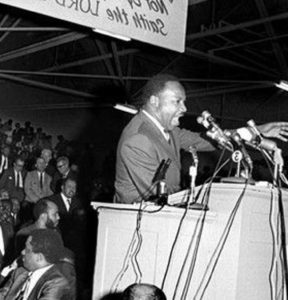
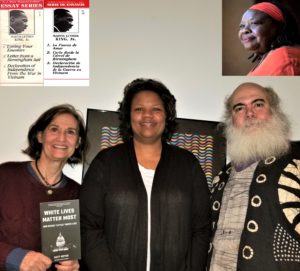
Honoring the Legacy Of Dr. Martin Luther King Jr.
Today on Law and Disorder we bring you a special hour-long program honoring the life and legacy of the Rev. Dr. Martin Luther King. Our listeners know all too well that the Nobel Peace Prize laureate was shot on April 4, 1968–51 years ago. Not so well known is the radical Dr. King, who said in the last months of his life that:
“Our only hope today lies in our ability to recapture the revolutionary spirit and go out into a sometimes hostile world, declaring eternal hostility to poverty, racism, and militarism. With this powerful commitment we shall boldly challenge the status quo.”
Joining us are special guests Ruby Sales, a colleague of Dr. King’s and co-founder of the Student Nonviolent Coordinating Committee; and Rev. Dr. Emma Jordan-Simpson, Executive Director of the Fellowship of Reconciliation (F.O.R.). We’re also joined by author and activist Matt Meyer, a board member of the AJMI.
Dr. King began close ties with A.J. Muste and with the F.O.R. during the Montgomery bus boycott, when FOR staff members Bayard Rustin and Glenn Smiley came to Alabama to support local efforts nonviolently challenging racial segregation. Dr. King developed a special relationship with former FOR chairman A.J. Muste, whose absolute pacifism King had, as a theological seminary student, questioned.
Before heading F.O.R., Muste was a prominent labor leader, helping to found the militant Congress of Industrial Organizations (CIO). And Dr. King, of course, was killed exactly one year after taking a staunch anti-Vietnam war position and in the midst of supporting a significant strike of sanitation workers, linking—as he had been—issues of race, class, and violence as King deepened his critique of the roots of oppressive U.S. society.
Guest – Ruby Sales is the founder and director of the “SpiritHouse Project”, a national organization that uses the arts, research, education, action and spirituality to bring diverse peoples together to work for racial, economic and social justice as well as for spiritual maturity. A life-long organizer, scholar and public theologian in the areas of civil, gender and other human rights, she was a member of the Student Non-violent Coordinating Committee and served as national convener of the Make Every Church A Peace Church movement.
Guest – Rev. Dr. Emma Jordan-Simpson is the Executive Pastor of The Concord Baptist Church of Christ, Brooklyn, NY. She has combined pastoral ministry with the social justice community. The former Executive Director of the Children’s Defense Fund she is now the Executive Director of the Fellowship of Reconciliation.
Guest – Matt Meyer is Secretary-General of the International Peace Research Association, Chair of the International Fellowship of Reconciliation’s Financial Advisory Committee, Africa Support Network Coordinator of the War Resisters International, and Senior Research Scholar at U-Mass Amherst. As current National co-chair of FOR and former Chair of the War Resisters League, he is second only to AJ Muste in holding the top post of those two historic US peace organizations. He is author of the recently published White Lives Matter Most And Other “Little” White Lies.
———-

———-
Civil Liberties, Death Penalty, Human Rights, Political Prisoner, Supreme Court, Truth to Power, War Resister
Podcast: Play in new window | Download
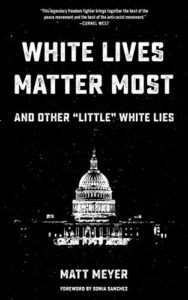
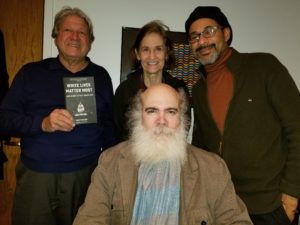
White Lives Matter Most And Other “Little” White Lies
In a society in which entrenched racism persists, is it possible for white activists to meaningfully engage in anti-racist movements such as the movement for black lives?
Longtime peace activist, educator and author Matt Meyer examines that question in his new book White Lives Matter Most And Other “Little” White Lies. As we honor the life and legacy of Reverend Dr. Martin Luther King Jr. we talk with Matt Meyer of whom Cornell West says “this legendary freedom fighter brings together the best of the peace movement and the best of the anti-racism movement. “
Guest – Matt Meyer is the International Peace Research Association representative at the United Nations, the national co-chair of the Fellowship of Reconciliation, and the War Resisters’ International Africa Support Network Coordinator. A noted educator, author, and organizer, Meyer focuses on an extensive range of human rights issues including support for political prisoners; solidarity with Puerto Rico, the Black Liberation movement and all decolonization movements; and bringing an end to patriarchy, militarism, and imperialism.
—-
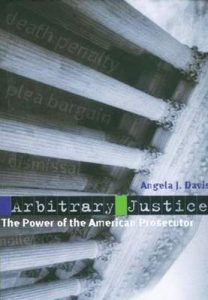
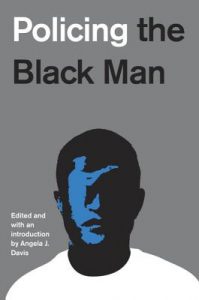
Attorney Angela Davis: Arbitrary Justice
“In the halls of justice”, it has been quipped, “the only justice you find is in the halls.” H. Rap Brown, a leader of SNCC, the Student Non-violent Coordinating Committee, said that justice in America means “just us”. There are 2.3 million people in American prisons today. A great proportion of them are African-Americans. If you assume Europe has the same social situation that we do in America, it is a telling fact that we have seven times as many prisoners. Part of the explanation for this phenomenon, In addition to the racist nature of the United States of America, is the power that the American prosecutor has. It is the power to choose whom to prosecute and for what crime. It is the power to obtain convictions, not to seek justice. It is a power that is discretionary and open to abuse. This abuse is rarely reviewable or punished.
Guest – Attorney and Professor Angela J. Davis author of Arbitrary Justice: The Power of the American Prosecutor. Her most recent book “Policing the Black Man” covers the key issues of the Black Lives Matter movement. Angela J. Davis, professor of law at American University Washington College of Law, is an expert in criminal law and procedure with a specific focus on prosecutorial power and racism in the criminal justice system. Davis previously served as director of the D.C. Public Defender Service, where she began as a staff attorney representing indigent juveniles and adults. She also served as executive director of the National Rainbow Coalition and is a former law clerk of the Honorable Theodore R. Newman, the former Chief Judge of the D.C. Court of Appeals. Davis is the author of Arbitrary Justice: The Power of the American Prosecutor
———

———
CIA Sponsored Terror, Civil Liberties, FBI Intrusion, Gaza, Human Rights, NSA Spying, Political Prisoner, Surveillance, Targeting Muslims, Torture, Truth to Power, War Resister
Podcast: Play in new window | Download
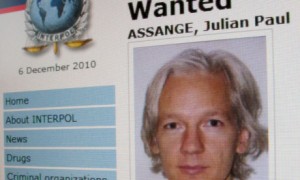
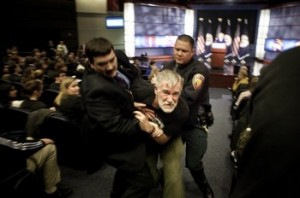
Ray McGovern: Clinton Email Wikileaks Valid
The prevailing Russia-gate narrative is that Russia colluded with Donald Trump to swing the 2016 election his way.
Special prosecutor Robert Mueller has led a nearly 2 year investigation in search of proving this. Under American law when a crime is committed prosecutors search for the culprit . In this case, critics say, the search is for the crime.
The investigation seems to be winding down with the expectation that he will soon issue his report. The major news media, Hillary Clinton, the Democratic Party, and the intelligence community have conducted a drum beat with a nearly fact free assertion that the Russians helped steal the 2016 election.
Is this story true? Is there more to it? Donald Trump after all ran his campaign on a position of easing tensions with Russia.
Is it really in our interest to perpetuate a cold war with a nuclear armed power?
Did Russia use Wikileaks and it’s editor Julian Assange to reveal secrets about the Democratic party? What were the secrets? What danger to free journalism and to truth tellers and whistle blowers does the acceptance of the allegation of Russian interference in the US elections are we facing?
Guest – Ray McGovern former CIA intelligence analyst, Ray briefed President George H. W. Bush every morning on intelligence matters, particularly with respect to Russia. He is a founder of VIPS, Veteran Intelligence Professionals for Sanity and a contributor to the blog Common Dreams.
—-


Defund Islamophobia Campaign
Fear and hatred of Arabs and Muslims existed in the United States especially after the first Gulf war, started by President George H. W. Bush a decade before the attacks on September 11, 2001.
This fear and hatred increased tremendously in the aftermath of those terrorist attacks. How could it be otherwise? It was used to stir up the American public in the ensuing devastating war against Iraq whose government was falsely linked to the attacks but wars were also fought simultaneously in six other predominately Muslim countries.
Anti-Muslim fear and hatred has been promoted in the United States by several groups and people including Pamela Geller, Daniel Pipes, and David Horowitz.
It turned out that these people and the groups through which they operate were massively funded to the tune of millions of dollars by the United Jewish Appeal in New York City and other Jewish charities in Chicago and San Francisco.
Guest – Donna Nevel is a community psychologist, educator, and co-director of PARCO. She is a long time organizer for justice and is a founding member of Jews Against Anti-Muslim Racism, Jews Say No!, and the Nakba Project.
Guest – Asaf Calderon is an Israel-American organizer and member of Jewish Voice for peace – New York City. He was born in Tel Aviv in 1991 and moved to New York in 2016. Asaf has a degree in history of the Middle East and Africa from the University of Tel Aviv, and he currently studies for his Masters of Social Work at Hunter College.
Islamophobia Report
BDSmovement.net / Endtheoccupation.org / JewishVoiceForPeace.org
CIA Sponsored Terror, Civil Liberties, Human Rights, Iraq War, Military Tribunal, Political Prisoner, Prison Industry, Prosecution of the Bush Administration, Supreme Court, Targeting Muslims, Torture, Truth to Power, War Resister
Podcast: Play in new window | Download
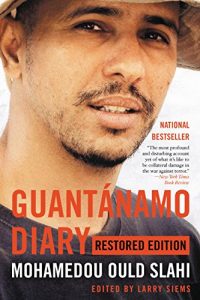

Guantanamo Diary: Mohamedou Ould Slahi
The American offshore prison camp in Guantánamo, Cuba is still operating. After the attacks on September 11, 2001, it was set up as a place where neither American or international law would apply and where prisoners could be brought, tortured, detained forever, and never charged with a crime. Ten years ago, former President Obama promised to close the offshore prison when he ran for office. It remains up and running to this day. Mohamedou Ould Slahi spent 18 years of his life there. He was an electrical engineer from Mauritania in Africa and educated in Germany. He was 32 years old when he was apprehended in his home, taken to Jordan where he was tortured, then to Afghanistan, then to Guantanamo and 16 years later at age 48, he was released. He walked out of Guantanamo Bay Prison in October 2016 without being charged with a crime and returned to his native Mauritania.
While in prison in 2005 he wrote a memoir, in English, one of his four languages. His attorney Nancy Hollander had asked him to do it and she finally got it declassified in 2012 but with heavy redactions. It was made into a book, titled Guantánamo Diary, and published in 2015 and became an international bestseller.
In it, he describes how he was tortured in ways personally approved by then Defense Secretary Donald Rumsfeld. Torture is a criminal act under both US and international law. As many know, Rumsfeld has yet to be prosecuted.
Guest – Mohamedou Ould Slahi joins hosts from his native country of Mauritania where he is a writer. He is the author of Guantanamo Diary.
Guest – Attorney Nancy Hollander has been a member of the firm Freedman Boyd Hollander Goldberg Ives & Duncan, P.A. since 1980 and a partner since 1983. Her practice is largely devoted to criminal cases, including those involving national security issues. She has also been counsel in numerous civil cases, forfeitures and administrative hearings, and has argued and won a case involving religious freedom in the United States Supreme Court. Ms. Hollander also served as a consultant to the defense in a high profile terrorism case in Ireland, has assisted counsel in other international cases and represents two prisoners at Guantanamo Bay Naval Base. Nancy is co-author of WestGroup’s Everytrial Criminal Defense Resource Book, Wharton’s Criminal Evidence, 15th Edition, and Wharton’s Criminal Procedure, 14th Edition. She has appeared on national television programs as PBS Now, Burden of Proof, the Today Show, Oprah Winfrey, CourtTV, and the MacNeill/Lehrer News Hour.
—-


Manhattan Neighborhood Network Supreme Court Case
Is a public-access TV channel run by private nonprofit corporation subject to the First Amendment? The Supreme Court will consider that question in a case involving the Manhattan Neighborhood Network or MNN. In 1991 MNN was designated to operate as a public-access channel in New York City. The Manhattan Borough President has no control over MNN but does pick two of its thirteen board members.
In 2012 Jesus Melendez, an occasional contributor to MNN, was suspended for trying to attend a board meeting. His associate Deedee Halleck then videoed him outside talking about the situation. MNN banned the video from airing. Melendez and Deedee brought a First Amendment claim against MNN asking if the network is a state actor for purposes of their First Amendment rights. The district court said no, noting that, while it was a close call, other circuits had concluded that privately run public-access networks were not state actors.
The Supreme Court hasn’t directly weighed in on this question although Justice Anthony Kennedy, in a 1996 concurrence in a case dealing with laws regulating content on public-access channels, wrote they should be considered state actors who run public fora and thus be subject to the First Amendment. Justice Clarence Thomas disagreed in his concurrence, writing that “franchising authorities require cable operators to create public access channels, but nothing in the record suggests that local franchising authorities take any formal easement or other property interest in those channels that would permit the government to designate that property as a public forum.”
Defenders of MNN claim, that while it’s possible that some public-access channels could be rightly called state actors, the Court should take the case to clarify the state-actor test and to review the Second Circuit’s unnecessarily broad opinion.
Guest – Deedee Halleck one of the plaintiffs in this case and among the top media activists. She’s co-founder of Paper Tiger Television and also the Deep Dish Satellite Network, the first grass roots community television network. She is Professor Emerita in the Department of Communication at the University of California at San Diego.
Guest – Attorney Paul W. Hughes, a partner in the law firm Mayer Brown’s appellate and Supreme Court practice. Paul has handled more than 200 appellate matters, more than 125 of which were in the U.S. Supreme Court. In 2017The American Lawyer named Hughes “Litigator of the Week” in connection with his immigration work.
Civil Liberties, Criminalizing Dissent, Human Rights, Political Prisoner, Prison Industry, Truth to Power
Podcast: Play in new window | Download
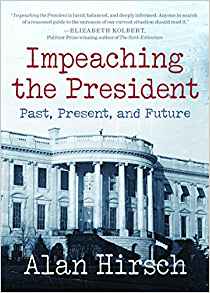
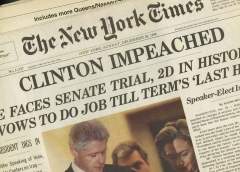
Impeaching the President: Past, Present and Future
Two U.S. presidents have been impeached: Andrew Johnson in 1868, and Bill Clinton in 1998. Richard Nixon would have been impeached but he resigned in 1974. Rumblings of impeaching the winner of the 2016 president elections even took place before the votes were in. Opponents of Hillary Clinton cited her use of a private e-mail server as Secretary of State as reason. Opponents of Donald Trump cited his business interests disqualified him. Possible criminal activities involving the Trump campaign added fuel to those calls.
Restraints on executive power exist because he greatest risk of tyranny comes from the executive branch. That’s partly because the president is a single person. In contrast, Congress and the Supreme Court must persuade a majority of their colleagues in order to act. As well, presidential authority as commander in chief includes the power to deploy weaponry as the head of the military and law enforcement.
The nation’s founding fathers value checks on tyranny. in part because of oppression by the British monarchy. At the Constitutional Convention some delegates opposed making one person responsible for executing the nation”s laws. While it decided in favor of a one-person executive, it adopted provisions aimed at preventing the president from becoming king-like.
Limits including four-year terms and voter approval to stay in office. The founders knew that even in four years the president could do much damage. So they created a mechanism for quicker replacement of the President if needed. The House of Representatives could “impeach” him, an accusation of wrongdoing that would prompt a trial in the Senate. If the Senate voted by two-thirds vote to convict the president, it would automatically result in removal from office. Impeachment can also be used to remove all federal officers.
Guest – Alan Hirsh, author of Impeaching the President: Past, Present and Future. Alan is a Lecturer in Humanities and Chair of Justice and Law Studies at Williams College. He’s also the author of For the People: What the Constitution Really Says About Your Rights and A Citizen’s Guide to Impeachment.
—-
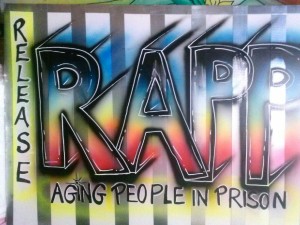
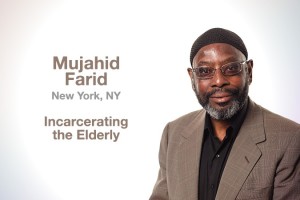
Remembering Mujahid Farid, Lead Organizer of Release Aging Persons in Prison
Today we remember and celebrate the life of Mujahid Farid who passed away last week in New York. Listeners will recall that Farid had been on Law and Disorder several times in the last few years, along with Laura Whitehorn and Dave George from his organization Release Aging Persons in Prison. In 1978, Farid was sentenced to 15 years to life in prison. He was 28 years old. He first became eligible for parole in 1993. He had earned four college degrees including two masters degrees while incarcerated. He was denied parole nine times. As we’ve discussed in prior segments, New York state parole commissioners denied his requests as with many others based on the nature of his crime rather than he many accomplishments he made while in prison.
In an article in the Village Voice, Farid noted that he asked the commissioners: “Is there anything I can do to make myself eligible for release?” He didn’t get a response but said he saw disapproving changes in the body language and facial expressions of the commissioners that his question wasn’t welcome. He was denied again. These denials added 18 years to his incarceration.
In 2011, Farid appeared before the parole boar for the tenth time. He stood before two new commissioners who had high rates of granting parole and that year, Farid was released. Farid became a 2013 Soros Justice Fellow. During his confinement, in 1987 Farid was part of a trio that created and proposed the first HIV/AIDS peer education program in New York State prisons, that later developed into the widely acclaimed state-wide program called PACE (Prisoners AIDS Counseling & Education). Farid participated in the creation of a college certificate program sponsored by New York Theological Seminary, and he taught introduction to sociology courses for people training for Alcohol and Substance Abuse (ASAT) counseling certification.
Since his release Farid initiated two programs designed to have an impact on dismantling mass incarceration: The RAPP Campaign and the Rise & Shine Small Business Coalition, the latter providing support for the creation and start-up of community businesses operating on principles of social entrepreneurship. In 2013 Farid was awarded a joint New York State legislative commendation for his community work and a Citizens Against Recidivism, Inc. award for social activism.
As listeners may recall, the number of people aged 50 and older in New York State, where RAPP was founded, has doubled since 2000; it now exceeds 10,000— which is about 20% of the total incarcerated population. This reflects a national crisis in the prison system and the extension of a culture of revenge and punishment into all areas of our society.
RAPP focuses on aging people in prison, many of whom are long-termers convicted of serious crimes. Many of these human beings have transformed their lives and developed skills and abilities they lacked before incarceration. They could be released from prison with little or no threat to public safety. Yet many are denied release, often for political reasons, and they needlessly remain imprisoned into old age. These elders could return to their communities if current mechanisms such as parole and compassionate release were correctly utilized.
Farid, you are in our thoughts and we send you our love.
Guest – Laura Whitehorn is a former political prisoner and native New Yorker, who was active in supporting groups such as the Black Panther Party, the Black Liberation Movement and was active with Students for a Democratic Society and the Weather Underground. Laura worked to help expose the FBI’s Counter Intelligence programs.
Guest – Mujahid Farid co-founded the Prisoners AIDS Counseling and Education program and helped design prison-based sociology and theology courses that allowed others to earn college-credited in prison. He also earned four college degrees and other certifications while incarcerated, including his paralegal certificate, NYS Department of Labor Certificate in Human Development Counseling, and NYC Department of Health Certificate in HIV/AIDS Counseling.
—————————-

—————————-
CIA Sponsored Terror, Civil Liberties, Habeas Corpus, Human Rights, Iraq War, Political Prisoner, Torture, Truth to Power, War Resister
Podcast: Play in new window | Download
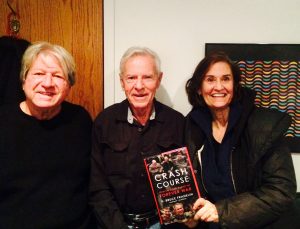
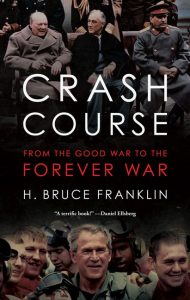
Crash Course : From the Good War to the Forever War
US Army Ranger turned conscientious objector Rory Fanning recently wrote in this in The Guardian newspaper: “Last week Sunday ,November 11, we celebrated Veterans Day. It used to be called Armistice Day and was a celebration of peace after the slaughter of World War One. Now it is called Veterans Day. The United States has 668 military bases around the globe. The United States has conducted military operations in 2/3 of the world’s countries since September 11, 2001. It has spent 3/4 of $1 trillion each year on it’s military – more than the next 13 countries combined. The US has taken hundreds of thousands of lives around the world these past 14 years and shows no signs of slowing down.“
Guest – H. Bruce Franklin, is one of America’s leading cultural historians, H. Bruce Franklin is the author or editor of nineteen books and more than 300 articles on culture and history published in more than a hundred major magazines and newspapers, academic journals, and reference works. He has given over five hundred addresses on college campuses, on radio and TV shows, and at academic conferences, museums, and libraries, and he has participated in making four films. He has taught at Stanford University, Johns Hopkins, Wesleyan, and Yale and currently is the John Cotton Dana Professor of English and American Studies at Rutgers University in Newark. Before becoming an academic, Franklin worked in factories, was a tugboat mate and deckhand, and flew for three years in the United States Air Force as a Strategic Air Command navigator and intelligence officer. Professor Franklin is touring the country to speak about his just publish book Crash Course : From the Good War to the Forever War.
—————————

—————————




















